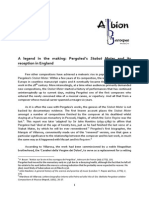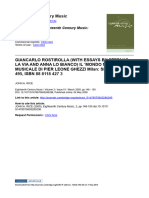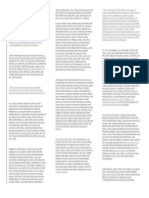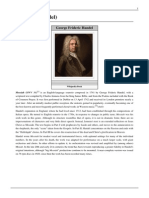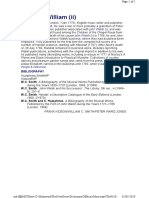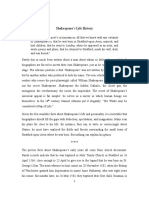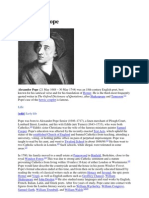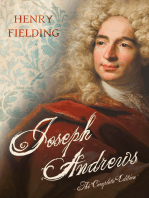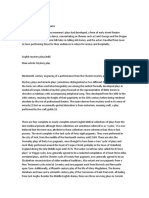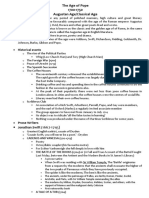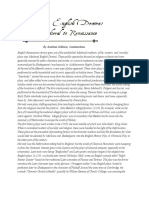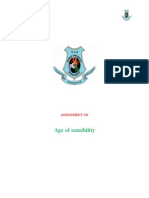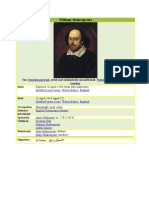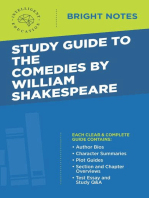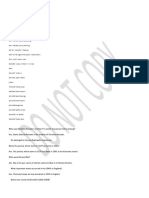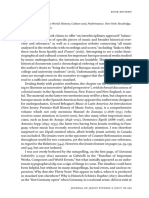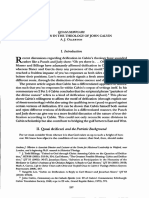350 Notes and Queries: Serpine Or, The Birth and Adventures of Harle-Quin. Rich Had Frequently Acted in The Role of
350 Notes and Queries: Serpine Or, The Birth and Adventures of Harle-Quin. Rich Had Frequently Acted in The Role of
Uploaded by
JoshyBloorOriginal Description:
Original Title
Copyright
Available Formats
Share this document
Did you find this document useful?
Is this content inappropriate?
Report this DocumentCopyright:
Available Formats
350 Notes and Queries: Serpine Or, The Birth and Adventures of Harle-Quin. Rich Had Frequently Acted in The Role of
350 Notes and Queries: Serpine Or, The Birth and Adventures of Harle-Quin. Rich Had Frequently Acted in The Role of
Uploaded by
JoshyBloorCopyright:
Available Formats
350
NOTES AND QUERIES
September 1999
the alleged animosity of Swift to 'the memory
of William the Third'. There is little supporting
evidence for this animosity, but Swift's 'letter'
to Pope of 10 January 1721 is suggestive of the
extent to which his views had changed substantially since, some three decades earlier, he had
penned his 'Ode to King William, On His
Successes in Ireland':
DAVID CHANDLER
Corpus Christi College, Oxford
5
The Correspondence of Jonathan Swift, ed. Harold Williams, 5 vols (Oxford, 1963-5), II, 372.
in the standard works in the field. For examples of works
that mention the existence of the song but fail to make use of
Butterworth's transcription (or the original manuscript), see
Albert M. Lyles, Methodism Mocked: The Satiric Reaction to
Methodism in the Eighteenth Century (London, 1960), 17;
Frederick C. Gill, Charles Wesley, the First Methodist (New
York, 1964), 120-1.
3
See entry in Philip H. HighfiU Jr, Kalman A. Burnim,
and Edward A. Langhans, A Biographical Dictionary of
Actors, Actresses, Musicians, Dancers, Managers & Other
Stage Personnel in London, 1660-1800, 16 vols (Carbondale,
111., 1973-93), XII, 337-53, which corrects many of the errors
found in C. F[eU] S[mhh], 'Rich, John (16827-1761)', DNB.
Downloaded from http://nq.oxfordjournals.org/ at The University of Manchester Library on May 4, 2013
'ADIEU THE DELIGHTS OF THE
STAGE': AN ANTI-METHODIST
SONG OF 1746
ON 24 November 1746, John Rich appeared
on the stage of Covent Garden Theatre as
Harlequin in Lewis Theobald's Rape of Proserpine; or, the Birth and Adventures of Harlequin. Rich had frequently acted in the role of
As to what is called a Revolution-principle, Harlequin for the previous three decades and
my opinion was this; That whenever those had performed in Theobald's Rape a number
evils which usually attend and follow a vio- of times in the 1745-6 season alone. Yet this
lent change of government, were not in performance of the afterpiece was to be differprobability so pernicious as the grievances ent, as the following extract from the advertisewe suffer under a present power, then the ment indicates: 'Also The Rape of Proserpine.
publick good will justify such a Revolution; With an additional Comic Scene. Harlequin1
and this I took to have been the Case in the Lun; the other parts as usual'. The additional
Prince of Orange's expedition, although in scene contained 'Adieu the Delights of the
the consequences it produced some very bad Stage', a new anti-Methodist song composed
effects, which are likely to stick long enough by 'Lun' (which was Rich's stage name when
he performed as Harlequin). Rich added the
by us. [italics mine]5
musical lampoon primarily for domestic reaThis 'letter', never sent, was clearly intended
sons, most notably because his wife had
for publication (it was published by Faulkner
recently become a member of the new Methodin 1741) and if Swift was prepared to mention
ist movement. This musical attack, which has
publicly the 'very bad effects' of William's
received little scholarly attention,2 thus proGlorious Revolution then the sentiments
vides evidence on eighteenth-century theatre
ascribed to him 'when in the company of his
history, the early growth of Methodism and
intimates' do not seem particularly surprising.
anti-Methodism, and the complex roles of
Indeed the 'Anecdote'', in this case, can be read
women in the Georgian period.
as a useful piece of supplementary biographical
John Rich (1692-1761) holds a secure place
information.
3
Beyond this, unfortunately, it is not possible in the history of the English theatre. He took
to go. The supplier of the 'Anecdote' was
' Arthur H. Scouten (ed.), The London Stage . . . Pan 3:
clearly familiar with information, or a tradition 1729-1747, 2 vols (Carbondale, 111., 1961), II, 1265. This is
of information, close to Swift, and may have presumably a direct quotation from a contemporary advertbut Scouten does not give the source.
possessed copies of some of Swift's unpub- isement,
2
Numerous writers have referred to the song in passing;
lished verse. There seems no good reason to see, for instance, 'Charles Wesley and the Theatrical
doubt his information, or, by extension, his Woman', in J. B. Wakeley, Anecdotes of the Wesleys: Illusattribution of the 'paraphrase' to Swift. Sim- trative of Their Character and Personal History (New York,
ilarly there is no reason to doubt the extem- 1869), 369-70. Note that R[ichard] Butterworth, 'Mrs.
Rich', Proceedings of the Wesley Historical Society, 1
poraneous nature of the verse, nor that Swift (1897-98), 58, provides a fairly accurate transcription of
had the ability to turn it thus.
the song, but his version has not been quoted, or even cited,
September 1999
NOTES AND QUERIES
4
Paul Sawyer, 'John Rich's Contribution to the
Eighteenth-Century London Stage', in Essays on the Eighteenth Century English Stage, ed. Kenneth Richards and
Peter Thompson (London, 1972), 90-1, 93; idem, "The
Popularity of Pantomime on the London Stage, 17201760', Restoration and 18th Century Theatre Research, v, 2
(1990), 1-16.
5
Highfill, Biographical Dictionary, XIV, 266-9.
6
Celina Fox, 'Hogarth's Southwark Fair', Print Quarterly, iv (1987), 421-3, discusses contemporary illustrations
of both fairs.
given particularly free rein in the years after
1737.7
The Methodist Revival set in motion the
events that would change all of this. John and
Charles Wesley launched their sustained campaign of field preaching in 1739, and soon they
were proselytizing not only outdoors but also
in houses, barns, and their own plain chapels in
most of the important towns of England. In
May 1743, they took possession of West Street
Chapel, Seven Dials, in London. 8 Charles
Wesley's daughter Sarah (1759-1828) later
wrote an account of one of the early congregation members.
Mrs. Rich was one of the first who attended
West-Street Chapel, and was impressed with
deep seriousness by the preaching of my dear
Father, who became her intimate friend;
upon which she gave up the stage entirely,
and suffered much reproach from her husband, who insisted on her appearing again
upon it. She said, if she did appear on the
stage again, it would be to bear her public
testimony against it. In consequence of this
declaration, she escaped further importunity.9
'Mrs. Stevens' is last recorded performing on
20 October 1744, ironically as Anne Boleyn in
Shakespeare's Henry^ VIII. She married John
five weeks later on 25 November.
In short, within about a year after her first
contact with the Methodists, Priscilla had
become a born-again convert, abandoned the
stage, and altered her status from 'housekeeper' of a notorious libertine to John
Rich's legal wife. As a setting for their more
respectable lifestyle, they took a house in the
7
Around 1730 (that is, during his second marriage), Rich
had an illegitimate daughter, and in 1735 he founded the
Beefsteak Society, a group of revellers whose original members included William Hogarth. Highfill, Biographical Dictionary, XII, 349; Walter Arnold, The Life and Death of the
Sublime Society of Beef Steaks (London, 1871), xi.
8
John Wesley, Journals and Diaries, ed. W. Reginald
Ward and Richard P. Heitzenrater, 6 vols to date (Nashville,
1988- ), II, 326 (29 May 1743). For recent accounts of early
Methodism, see Henry D. Rack, Reasonable Enthusiast:
John Wesley and the Rise of Methodism, 2nd edn (London,
1992), ch. 5; Richard P. Heitzenrater, Wesley and the People
Called Methodists (Nashville, 1995), chs 3-4.
' 'Original Tunes of Handel Set to Mr. Wesley's Hymns',
Wesleyan-Methodist Magazine, xlix (1826), 818. Given the
friendship between the Rich and Charles Wesley families,
Sarah could have heard this story directly from Priscilla Rich.
Downloaded from http://nq.oxfordjournals.org/ at The University of Manchester Library on May 4, 2013
over the management of Lincoln's Inn Fields
Theatre in 1714 on the death of his father
Christopher, and by 1716 he was performing
Harlequin in pantomime. While he cannot be
given credit for introducing either pantomime
or Harlequin to the English stage, he was a
zealous early promoter of both. Among other
things, he used them in a relatively new format,
the theatrical afterpiece, which he ultimately
brought to perfection. Paul Sawyer labels him
'an afterpiece man' whose combination of serious (often mythological) pantomime with a
ribald harlequinade might incorporate song,
dance, and recitative. The resulting pastiche
sometimes came to resemble a miniature operetta.4 Among Rich's other accomplishments
was his decision to produce John Gay's Beggar's Opera after it had been rejected at Drury
Lane. Its stunning success gave rise to the
epithet by which Rich is best known: the
Beggar's Opera, it was claimed, had made
'Gay rich, and Rich gay'. His critical and
financial success with the afterpieces, the Beggar's Opera, and many other ventures ultimately enabled Rich to build Covent Garden
Theatre, to which he removed his company
(and his Harlequin performances) in 1732.
His future wife and religious nemesis, Priscilla Wilford (c. 1713-83), had a much less
distinguished background. 5 A sometime barmaid, she is first recorded as appearing on
stage at the Southwark and Bartholomew
fairs in 1730.6 Before the end of the year, she
had joined Rich's company using the stage
name 'Mrs. Stevens'. It is also recorded that
she became Rich's housekeeper, but this probably occurred after the death of his second wife
in 1737 when Rich moved to a house near his
Covent Garden Theatre. By all accounts, Rich
maintained an extravagant and libertine lifestyle. While this was probably a chronic state
of affairs, it seems likely that it could have been
351
352
NOTES AND QUERIES
10
An engraving entitled Garden Scene at Mr. Rich's Villa
at Cowley is reproduced in Richard Butterworth, 'From the
Green-Room to the Class-Room', Wesleyan-Methodist
Magazine, cxx (1897), 336.
11
The Journal of the Rev. Charles Wesley. M.A., ed.
Thomas Jackson, 2 vols (London, 1849), I, 407, 410-11.
For additional discussion of the Riches, see Jackson, The
Life of the Rev. Charles Wesley, M.A., 2 vols (London,
1841), 1,432-5.
12
Butterworth, 'Green-Room', 339. The text of 'On the
Death of a Child' can be found in The Poetical Works of
John and Charles Wesley, ed. G. Osborn, 13 vols (London,
1868-72), IV, 245-6.
the character of Harlequin Preacher to convince the town he is not a Methodist. Oh; pray
for him that he may be a Christian indeed and
then he will be no more concern'd about what
he is cal'd.' The song she jotted down contains
many of the familiar anti-Methodist themes of
the day.13
[1]
Adieu the Delights of the Stage
My Barrow and rare Mellow Pears
Poor Lun is reforming the Age
By psa'lm singing preaching & prayers
His Harlequin Coat thrown aside To the Band and the Gown must give place
And his Warnings go forth far & Wide
To Convert Covent Garden to Grace
2
Tis Godliness only is gain
That lasting contentment best yields
And what the poor Stage tries in Vain
May be done on a Stool in Moorfields
The Scenes that [were rais'd] for [the Muse]
Shall fill you with sanctify'd Qualms
The Boxes be turn'd into Pews
And the Musick play nothing but psalms
3
Precisely at Six it begins
My Flock shall go edify'd hence
your Methodist takes all your Sins
So with em he takes but your pence
Come Brethren and Sisters attend
I'll open your Eyes to new Light
Be warn'd by the Voice of a Friend
And crow'd to my preaching each Night
The performance of the song was undoubtedly suffused with humorous gestures
and intonations. One can imagine, for example,
that not all the 'Mellow Pears' Harlequin addressed were in his barrow and that the word
'psa'lm' could have been stretched to more
than one syllable with any number of vocal
13
John Rylands University Library of Manchester [hereafter JRULM], DDWES 2/13-14, Priscilla Rich to [Charles
Wesley], London, 27 Nov. 1746, with enclosure. The song is
written entirely on fo. 14. Reproduced by courtesy of the
Director and University Librarian, the John Rylands University Library of Manchester. I would also like to thank the
Archives Committee of the Methodist Church for their
permission to publish this work. Mrs Rich's apparent intention was to indent every second line, and that format has
consequently been adopted here. With the exception of the
dash at the end of verse 1, line 5, there is no end-of-the-line
punctuation. The initial letter of every line is in upper case
with the exception of verse 3, line 3. Verse 2, line 5 is torn
and partially illegible, but this seems to be the most plausible
reading of the mutilated words. Butterworth's version of the
line in 'Mrs. Rich', 58, reads as follows: "The scenes that
years [past could amuse]'. Butterworth's transcription of the
song alters the punctuation, capitalization, and indentations
found in the original manuscript.
Downloaded from http://nq.oxfordjournals.org/ at The University of Manchester Library on May 4, 2013
country, at Cowley near Uxbridge in Middlesex, and they kept their own coach to transport
themselves and their guests between Cowley
and the Infernal Wen.10 The transforming
power of Methodism had clearly achieved
another triumph in the person of Priscilla Rich.
John Rich was less easily influenced. Even
Charles Wesley expressed some misgivings
about the unequally yoked pair in a journal
entry that described his visit to the Riches in
1745: 'I dined at Mrs. R's. The family concealed their fright tolerably well. Mr. R.
behaved with great civility. I foresee the
storm my visit will bring upon him.' In the
spring of 1746, Wesley records that while
riding to Brentford 'with our sisters Davey,
Alcroft, and Rich, our coach broke down', 11
and Priscilla Rich probably joined Charles
Wesley on other occasions during 1745 and
1746. It was also during this period that Priscilla Rich lost a child in infancy, an event that
inspired Charles Wesley to compose two
hymns of mourning ('On the Death of a
Child' and 'On the Death of Miss R.', the
latter set to the tune 'Cowley'). Obviously,
Priscilla Rich occupied an important place in
Charles Wesley's circle of religious friends
during the mid-1740s.12
One can only speculate on the thoughts and
feelings of John Rich regarding the conduct of
his new wife with this enthusiastic, unmarried
field preacher. It seems safe to conclude that
Rich's announcement and public performance
of the anti-Methodist song was the climax of a
domestic tug-of-war. He performed the song
on 24 and 26 November, that is, on the days
before and after the Riches' second wedding
anniversary. On 27 November, a distressed
Priscilla wrote to Charles Wesley: 'the enclos'd
is a copy of a Song Mr Rich has sung in a new
scene added to one of his old entertainments in
September 1999
September 1999
NOTES AND QUERIES
14
The Progress of Methodism in Bristol: or, the Methodist
Unmask'd by 'an Imprtial Hand' (Bristol, 1743), 22-3, refers
to an religious lovefeast held at night that included 'pious
Sisters, Wives, and Misses' and male adherents who 'greet
them, well, with holy Kisses'.
1767, Mrs Rich was inviting Charles Wesley Jr
to hear oratorio performances in London. 15
A further intention of Priscilla's 27 November letter was to bemoan the spiritual state of
her husband. She refers to him as 'my poor
Partner who I fear has in a Great Measure
Stifl'd the Convictions god Gave him'. Commenting on all her woes, she vows that with
God's grace, 'I still hope to Conquer all the
enemys [sic] of my Soul'. Wesley's epistolary
response to this letter is not extant, but he once
again reacted to a crisis in the Rich family by
writing a hymn. Entitled 'For a Persecuting
Husband', it is narrated by a woman who
addresses Jesus about her unsympathetic husband. She achieves a dramatic climax with her
questions in the third verse:
Still mine eyes for him o'er flow
Whom Thyself hast join'd to me:
Partner of my weal and woe,
Can I his destruction see?
See his soul insensible
Madly rushing down to hell?16
Wesley, in sum, responded to John Rich's
humorous song with a serious evangelical
riposte in which the persecuting husband is
headed not for an evening religious gathering
with 'brethren and sisters' but rather for an
eternal 'Adieu' in the dark underworld with the
damned.
Powerful support from Charles Wesley
helped Priscilla Rich to achieve victory over
at least one of her 'enemys'. The available
documentation indicates that her husband
sang his new anti-Methodist song only three
times, that is, in the two performances before
Priscilla wrote her letter and once again on
2 December. Four days letter, he 'Paid Mrs La
Font for her 3 nights in The Rape of Proserpine
15s.', and The Rape was not performed again at
Covent Garden for the next thirteen years.17
This circumstantial evidence from the theatre
can be supplemented by a considerable amount
of anecdotal testimony, some of it anonymous.
15
JRULM, DDCW 5/19, Wesley to [Sarah Gwynne, later
Mrs. Charles Wesley], Shoreham, Kent, [14 Jan. 1749]; ibid.
6/38, Wesley to [Sarah Wesley], London, 1 May 1753; ibid,
same to same, London, 9 Aug. 1766; ibid. 1/58, Wesley to
Samuel Lloyd, Bristol 13-14 Feb. 1767. Charles's daughter
Sarah (see n. 9) states that Priscilla 'retained her affection to
my Father and Mother during her long life'.
" John and Charles Wesley, Poetical Works, VII, 153-4.
17
Scouten, London Stage, II, 1268-9.
Downloaded from http://nq.oxfordjournals.org/ at The University of Manchester Library on May 4, 2013
devices (extended falsetto would be especially
effective). Converting the infamously immoral
Covent Garden 'to Grace' must have seemed a
laughable impossibility to any theatre audience
of the period. Moorfields was the scene of
much outdoor preaching by the Methodists
but was also the location of Bedlam, the infamous lunatic asylum. The irony of preaching
'Godliness' as the only 'gain' and then taking
people's pence was a theme commonly found in
contemporary anti-Methodist literature. So
too was licentiousness. The fact that the 'Brethren and Sisters' should seek the Methodist
'New Light' in the evening was undoubtedly
meant to suggest the existence of immoral
behaviour among the converts. As Harlequin
turns preacher, in other words, the 'Delights of
the Stage' yield to the pleasures - spiritual or
otherwise - that could be obtained at nocturnal
Methodist meetings.14
While Priscilla's letter has served to preserve
the song, her intention was to lament its performance and seek consolation from her spiritual mentor. She had had some deep (though
unspecified) spiritual experiences but was wary
of revealing them to others. As she wrote to
Charles Wesley: 'Oh; think what it is to be
Oblig'd to Conceal this from the Eys [sic] of
those that know nothing of these things but call
it all Madness.' If the song can be accepted as
evidence on this point, Priscilla's husband was
probably among those in the latter category.
She states that Wesley's letter (to which she is
replying and which is apparently not extant)
'gave me Great comfort, and at a time I had
much need of it', perhaps a reference to the
death of her infant daughter. It is not surprising that Priscilla Rich's friendship with Charles
Wesley, based on shared religious views, their
mutual love of music, and their sympathetic
regard for one another, endured for decades. In
1749, Wesley spent the afternoon at her house
in Cowley to hear 'some New Tunes played
over'. He wrote to his wife Sarah in 1753 that
'Mrs Rich sends her sincere Love'. In 1766 and
353
354
NOTES AND QUERIES
Mrs. Rich was a Methodist, - not that I
mention it as a recommendation, or that she
was a better Christian for bowing at the
shrine of Nonsense and Hypocrisy. . . .
[The Methodists'] composition is gloom,
melancholy, envy, and spleen; cheerfulness
is seldom observed to dawn on their countenances. Notwithstanding their boasted
inspirations, if Methodist preachers had a
little reflection, what must they think of
daring to pronounce every theatre the devil's
house, and all the players the devil's children!21
No Players I'll have but are Saints,
No rakehelly, swaggering Bullies,
No Whores that use Washes and Paints
To draw in their vile carnal Cullies.
My women inspired shall be,
My Men fit for Martyrs to die,
Most holy in ev'ry Degree,
And chaste, like my Deary and I.
The young Covent Garden actress George
Anne Bellamy was warmly greeted at Cowley
by John Rich on one occasion but was received
rather more coolly by Priscilla. Bellamy's subsequent comment echoes the emphasis on
Methodists' greed found in. 'Adieu the
Delights' and other sources: 'This lady,
Although this anonymous sheet makes no
having been converted to Methodism, now
explicit references, it seems plausible to suggest
thought of nothing but praying and accumuthat Harlequin and his 'Deary' were meant to
lating wealth for herself and her spouse. For
satirize John and Priscilla Rich.19
those good people seldom neglect that grand
Many associated with the London literary concern, however they may censure such
and theatrical worlds likewise noted the worldly wisdom in the unconverted.'22 The
changes caused by the introduction of Method- available evidence, in sum, points to the conism into the Rich household. In Roderick clusion that Priscilla's Methodism had won out
Random (1748), Tobias Smollett pillories over John's anti-Methodism soon after his
John Rich in the character Mr Vandal, a performances of the anti-Methodist song and
theatre manager. According to Smollett, this that her influence over him, at least in religious
impressario's head, 'which was not naturally matters, remained strong for most of the
very clear, had been disordered with supersti- remaining fifteen years of his life.
tion, and . . . he laboured under the tyranny of
The existence of 'Adieu the Delights of the
a wife, and the terrors of hell fire at the same
time'. 20 The actor and theatrical producer Tate Stage' suggests the need for a reassessment of
Wilkinson dwells on the paradox of an actor the vicissitudes of anti-Methodism on the Engand theatre owner being married to a Method- lish stage. This need is all the more apparent
because neither the song nor anti-Methodism
ist devotee.
in the theatre has been much noticed by critics.
18
A Letter to a Certain Patentee (1747), quoted in Highfill, Biographical Dictionary, XII, 347.
19
Harlequin Methodist: To the Tune of. An Old Woman
Cloathed in Grey (n.p., n.d.); Thelma Niklaus, Harlequin or
The Rise and Fall of a Bergamask Rogue (London, 1956),
154-5. There appears to be no evidence to support the
contention that this print appeared in 'c. 1763', which is
the date given in Frederick George Stephens and Mary
Dorothy George, Catalogue of Political and Personal Satires
. . .in the British Museum, 11 vols (London, 1870-1954), IV,
330-1, no. 4092. Stephens does not even mention the Riches
but instead asserts that 'it is probable that this satire may be
associated with' the actor-playwright Samuel Foote.
20
Tobias Smollett, The Adventures of Roderick Random, 2
vols (London, 1748), II, 298-9.
21
Tate Wilkinson, Memoirs of His Own Life, 4 vols
(York, 1790), III, 3-4.
22
George Anne Bellamy, An Apology for the Life of
George Anne Bellamy: Late of Covent-Garden Theatre, 6
vols, 3rd edn (London, 1785), I, 197-8. The threat to the
British government posed by the Forty-Five may have
increased public anxiety about challenges to patriarchy in
a variety of contexts. For insights into this broader topic, see
Henry Fielding's anti-Methodist work, The Female Husband: or, the Surprising History of Mrs. Mary, alias Mr.
George Hamilton (London, 1746); and the satiric print, The
Female Volunteer, or, An Attempt to Make our men Stand
(1746), discussed in Herbert M. Atherton, Political Prints in
the Age of Hogarth: A Study of the Ideographic Representation of Politics (Oxford, 1974), 272.
Downloaded from http://nq.oxfordjournals.org/ at The University of Manchester Library on May 4, 2013
Already in 1747 a pamphlet was claiming that
John Rich 'is now like the lost Sheep that is
found: He hath now turn'd the Brothel into a
Temple, and he kneeleth to pray where he hath
kneel'd heretofore to '.' 8 Harlequin Methodist, an illustrated broadside that was being sold
in 1750 makes much the same suggestion without naming the Riches. It shows Harlequin
standing on a stool preaching in a theatrical
setting meant to represent Moorfields. Bedlam
is depicted on the backdrop. At Harlequin's
feet sits a middle-aged devotee with folded
hands. The accompanying verse reads in part:
September 1999
September 1999
NOTES AND QUERIES
It is now possible to move beyond these
problematic analyses and suggest that there
were at least four phases in the career of antiMethodism on the English stage. In the first,
from 1739 to 1746, the phenomenon was evident, if not prominent, in London and the
provinces. Thomas Cooke's Mournful Nuptials
(written in 1739 but not performed until 1743)
contains an anti-Methodist epilogue that actually makes reference to 'Whitefield Harlequin'. 26 Thomas Este's Methodism Display'd
23
Lyles, Methodism Mocked, 17.
T. B. Shepherd, Methodism and the Literature of the
Eighteenth Century (London, 1940), 200.
25
Terrence Xavier McGovern, "The Methodist Revival
and the British Stage' (Ph.D. dissertation, University of
Georgia, 1978), 297 n. 17.
26
[Thomas] Cooke, The Mournful Nuptials, or Love the
Cure of ail Woes (London, 1739), 71-2. See the discussion by
24
was performed in Newcastle-upon-Tyne in
1743 despite the ominous collapse of the
stage during a performance.27 The MockPreacher (1739) contains a statement to the
effect that it had been performed both in the
Metropolis and by strolling players in the
country, but this claim may have been spurious.28 In the second phase, from 1746 to 1760,
the influence of Priscilla Rich over her husband
helped to assure that the influence of antiMethodism on the London stage was muted.
There is likewise no evidence of antiMethodism on the provincial stage during
this period, the country perhaps taking its cue
from the Metropolis.
The floodgates were opened in the third
phase beginning with the production of
Samuel Foote's The Minor at Drury Lane
Theatre in 1760. John Rich died in the next
year (he was buried close to his second wife),
and Priscilla appears to have played a diminished role in the affairs of the theatre beginning
around this time. Indeed, there were even
productions of a pirated version of the antiMethodist Minor at Covent Garden in the
1760s, some of them mounted a short time
before the death of John Rich.29 The fourth
phase began around 1770 and witnessed the
gradual decline of anti-Methodism in the English theatre and its virtual disappearance by the
Buckroyd in Nicholas Lyons a n d Peter Buckroyd, ' T w o
Anti-Methodist Publications', Proceedings of the Wesley
Historical Society, xxxix (1973-4), 4 4 - 7 .
27
T h o m a s Este, Methodism Display'd: A Farce of One Act
(Newcastle-upon-Tyne, [1744]). Further information on this
work can be found in John Wesley, Journal, III, 3-4 (2 Nov.
1743); and Leo Hughes, 'Trick Upon Trick; or, Methodism
Display'd', Studies in English, xxix (1950), 51-61. In her
27 Nov. 1746 letter to Charles Wesley, Priscilla Rich refers to
her husband's performance of Harlequin Preacher in 'one of
his old entertainments', but the portrayal may not have been
explicitly anti-Methodist. It could have satirized flamboyant
or pretentious Church of England clerics like John 'Orator'
Henley (who was also a target of Hogarth's graphic satires).
See Graham Midgley, The Life of Orator Henley (Oxford,
1973).
28
The Mock-Preacher: A Satyrico-Comical-Allegorical
Farce (London, 1739), title page; McGovern, 'Methodist
Revival', 314-17.
29
Wilkinson, Memoirs, III, 3, 15-31; George Winchester
Stone (ed.), The London Stage . . . Part 4: 1747-1776, 3 vols
(Carbondale, Illinois, 1962), II, 827, 902, 913, and passim.
T. B. Shepherd (in 'Methodists and the Theatre in the
Eighteenth Century', Proceedings of the Wesley Historical
Society, xxi (1937-8), 6), states that Foote 'had some fears
about its production' because of Mrs Rich.
Downloaded from http://nq.oxfordjournals.org/ at The University of Manchester Library on May 4, 2013
In his major book-length study of antiMethodism, Albert Lyles refers briefly to Mrs
Rich and the song. Yet he misdates her letter
and does not seem to know that she was John
Rich's wife. Moreover, he makes no attempt to
assess the wider significance of the episode.23
While not mentioning the song specifically,
T. B. Shepherd emphasizes the influence of
Priscilla: 'After 1770, the anti-Methodist references on the stage seem to have become much
fewer. This may have been due in part to the
friendship of Charles Wesley with Mrs. Rich
[and various others] . . ., but it was also due to
the growing prestige of John Wesley.'24 There
are potential problems with Shepherd's chronology, however, since 'after 1770' John Rich
was dead, and Priscilla was no longer actively
involved in the London theatrical world. These
difficulties may result from Shepherd's apparent ignorance of the song, its context, and its
importance. Seizing upon this, Terrence
McGovern cites Rich's song as evidence
against Shepherd: "The satirical attitude of
Rich expressed in the song gives little support
to T. B. Shepherd's contention that Mrs. Rich's
involvement with Charles Wesley may have
helped to quiet criticism of the Methodist on
the stage after 1770.'25 In other words, McGovern concludes that the existence of the
song serves to disprove the influence of Priscilla Rich on her husband's anti-Methodist
prejudices. He does seem to realize that the
song provoked a strong and ultimately successful counterattack by Priscilla.
355
356
Clive D. Field, ' T h e Social Composition of English
M e t h o d i s m to 1830: A M e m b e r s h i p Analysis', Bulletin of the
John Rylands University Library of Manchester, lxxvi (1994),
153-78.
31
Anna Clark, The Struggle for the Breeches: Gender and
the Making of the British Working Class (Berkeley, 1995),
98-9.
Methodist movement. To be sure, as Clark
indicates, the domestic sphere provided a
quiet redoubt for many Methodist women.
Yet Priscilla Rich's reaction to 'Adieu the
Delights of the Stage' shows that at least for
some eighteenth-century women, the home
could also be transformed into an effective
and influential command centre.
ROBERT GLEN
University of New Haven
'INSIGNIA VIRALIA' IN
THE MEMOIRS OF
MARTINUS SCRIBLERUS
CHAPTER III of the Scriblerus Memoirs lampoons Dr Woodward's pride in his supposedly
ancient shield.1 In it, Dr Cornelius mentions
The curious Prominence at the belly of that
figure, which some taking for the Cuspis of a
sword, denominated a Roman soldier;
others accounting the Insignia Viralia, pronounced to be one of the Dii Termini. . . ?
The meaning here has remained obscure;
Kerby-Miller in his notes (209) could only say
that 'the point of the jest is not clear', and
Levine (246) dropped this passage from the text
he discussed. There do exist formal Latin
phrases like 'decemvirali potestate', 3 but 'viralia' by itself is a nonce-word that can only
mean 'pertaining to a man'. Thus the passage is
just a learned bawdy joke. The 'Marks of
Manhood' resembling a spear-point standing
out from the belly naturally suggest one of the
ithyphallic watchman deities.
WILLIAM C. WATERHOUSE
The Pennsylvania State University
' J. M. Levine, Dr. Woodward's Shield: History, Science,
and Satire in Augustan England (Berkeley, 1977), 238-52.
2
C. Kerby-Miller (ed.), The Memoirs of the Extraordinary
Life. Works, and Discoveries of Marlinus Scriblerus (New
Haven, 1950), 104.
3
Cornelius Nepos, Vitae, Lysander, ii.
FIELDING'S LATIN POEM:
A CORRECTION
IN an admirable article on a Latin poem in
Henry Fielding's Journey from This World to
the Next {N&Q, ccxl (1995), 63-6), Barry
Baldwin noted that I had wrongly emended
Downloaded from http://nq.oxfordjournals.org/ at The University of Manchester Library on May 4, 2013
end of George Ill's reign. Neither the quarrel
over the 1746 song nor Priscilla's Methodist
faith probably had much impact on the theatrical events of this half century, pace Shepherd. Instead, the death of the most popular
target of the anti-Methodists, George Whitefield (1714-70), the growing respectability of
the remaining Methodist leaders (noted by
Shepherd and many others), the rising socioeconomic status of Methodist laypeople,30 and
the increasing acceptance of evangelical doctrines must be considered as the most important changes that helped to rid the English
theatre of its overt anti-Methodist bigotry.
'Adieu the Delights of the Stage' thus belies
its modest appearance and has significance for
scholars in a number of fields. Among other
things, it sheds light on a genre of anti-Methodism (popular songs and ballads) that has not
received much scholarly attention. Moreover,
the song and the events following its composition and performance furnish a basis for reevaluating the protracted career of anti-Methodism on the English stage and provide
insights into a neglected but intriguing skirmish
in what has been called the 'struggle for the
breeches'. Indeed, in her recent book of that
title, Anna Clark actually uses Priscilla Rich as
an example. Clark, a historian, states that 'by
the early nineteenth century, wives of prosperous artisans and tradesmen were moving out of
business activities, and the [diminished] role of
women in Methodism reflected this change'.
According to Clark, an instance of this
occurred when 'London Methodist Mrs. Rich
gave up her acting career'.31 Priscilla Rich does
not seem to provide a good illustration for
Clark's generalizations. Her retirement from
acting in the 1740s occurred soon after the
start of her Methodist experiences and furnished an early indication of her influence over
her husband. Then, during the succeeding
decade and a half, she had a significant
impact on the English stage (especially through
her efforts to stifle anti-Methodism), and she
simultaneously gained prominence in the
30
September 1999
NOTES AND QUERIES
You might also like
- Bloom, Harold - Shakespeare - Invention of The Human (Riverhead, 1998)Document770 pagesBloom, Harold - Shakespeare - Invention of The Human (Riverhead, 1998)Ababundis100% (20)
- Atestat EnglezaDocument49 pagesAtestat Englezatanase simona- mihaelaNoch keine Bewertungen
- ABO Essays - Pergolesi's Stabat Mater PDFDocument5 pagesABO Essays - Pergolesi's Stabat Mater PDFFernando Vidal Flores SarmientoNoch keine Bewertungen
- Gorboduc 1Document149 pagesGorboduc 1Fr Joby PulickakunnelNoch keine Bewertungen
- Gorboduc or Ferrex and PorrexDocument144 pagesGorboduc or Ferrex and PorrexO993100% (1)
- Life And Letters Of John Gay (1685-1732), Author of "The Beggar's Opera"From EverandLife And Letters Of John Gay (1685-1732), Author of "The Beggar's Opera"Noch keine Bewertungen
- Review Giancarlo Rostirolla Il Mondo NovDocument44 pagesReview Giancarlo Rostirolla Il Mondo Novyizhar shalomNoch keine Bewertungen
- Franz Joseph HaydnDocument29 pagesFranz Joseph HaydnCande BogdaNoch keine Bewertungen
- The Pepys Ballads Volume I The Pepys Ballads Volume 1 1535 1625 Numbers 1 45 Reprint 2014nbsped 9780674430143 9780674430112Document300 pagesThe Pepys Ballads Volume I The Pepys Ballads Volume 1 1535 1625 Numbers 1 45 Reprint 2014nbsped 9780674430143 9780674430112paulagbrainNoch keine Bewertungen
- Sir Watkin Williams Wynn and The Rutgers Handel Collection : by MartinpickerDocument15 pagesSir Watkin Williams Wynn and The Rutgers Handel Collection : by MartinpickerSixtusNoch keine Bewertungen
- William ShakespeareDocument5 pagesWilliam ShakespeareNat Del RosarioNoch keine Bewertungen
- Shakespeare His Life Art and Characters Volume I WiDocument174 pagesShakespeare His Life Art and Characters Volume I WiLilie RoseNoch keine Bewertungen
- Messiah (Handel)Document20 pagesMessiah (Handel)frollo1Noch keine Bewertungen
- Randall, William (Ii) : John Randall John Walsh John WalshDocument1 pageRandall, William (Ii) : John Randall John Walsh John WalshROIeDRONoch keine Bewertungen
- Shakespeare's Life HistoryDocument8 pagesShakespeare's Life HistoryAnonymous cHvjDH0ONoch keine Bewertungen
- Shakespeare:: Life, Art, and CharactersDocument230 pagesShakespeare:: Life, Art, and CharactersGutenberg.orgNoch keine Bewertungen
- Hamlet - William ShakespeareDocument469 pagesHamlet - William ShakespearerollingindaisiesNoch keine Bewertungen
- Alexander PopeDocument4 pagesAlexander PopeGobika Sree100% (1)
- William Shakespeare: BY Anukul Singhal Ix-A Roll No. 5Document14 pagesWilliam Shakespeare: BY Anukul Singhal Ix-A Roll No. 5Sakshi SinghalNoch keine Bewertungen
- Essential Novelists - Charlotte Lennox: the female quixoteFrom EverandEssential Novelists - Charlotte Lennox: the female quixoteNoch keine Bewertungen
- English DramaDocument9 pagesEnglish Dramapankaj gogoiNoch keine Bewertungen
- Life and Letters of John Gay (1685-1732) by Melville, Lewis, 1874-1932Document127 pagesLife and Letters of John Gay (1685-1732) by Melville, Lewis, 1874-1932Gutenberg.orgNoch keine Bewertungen
- Latin Polyphony Under Henry VIIIDocument17 pagesLatin Polyphony Under Henry VIIIenderman salami100% (1)
- British Music Through The AgesDocument7 pagesBritish Music Through The AgesJulienne PapeNoch keine Bewertungen
- Music of New York - The New Grove Dictionary of Music and MusiciansDocument44 pagesMusic of New York - The New Grove Dictionary of Music and MusiciansPedro R. Pérez100% (1)
- The Age of Pope 1700-1750 Augustan Age/Classical Age: Historical EventsDocument3 pagesThe Age of Pope 1700-1750 Augustan Age/Classical Age: Historical EventsSourabh Agarwal100% (1)
- Age of DrydenDocument6 pagesAge of DrydenDhivyaNoch keine Bewertungen
- An Apology for Actors: From the Edition of 1612, Compared with That of W. Cartwright. With an introduction and notesFrom EverandAn Apology for Actors: From the Edition of 1612, Compared with That of W. Cartwright. With an introduction and notesNoch keine Bewertungen
- Delphi Complete Plays of William Wycherley (Illustrated)From EverandDelphi Complete Plays of William Wycherley (Illustrated)Noch keine Bewertungen
- Biography of William ShakespeareDocument9 pagesBiography of William Shakespeareattika1850% (2)
- Renaissance Drama and TheatreDocument3 pagesRenaissance Drama and TheatreMuhsin KhanNoch keine Bewertungen
- William Shakespeare (1564 - 1616)Document6 pagesWilliam Shakespeare (1564 - 1616)KAPIL SHARMANoch keine Bewertungen
- Atestat AndreeaDocument25 pagesAtestat AndreeaMihaela Monica MotorcaNoch keine Bewertungen
- ASSIGNMENT ON Age of SensibilityDocument7 pagesASSIGNMENT ON Age of Sensibilityrisob khanNoch keine Bewertungen
- William Shakespeare - BiodataDocument5 pagesWilliam Shakespeare - BiodataAmin Aina100% (1)
- A Select Collection of Old English Plays: Originally Published by Robert Dodsley in the year 1744From EverandA Select Collection of Old English Plays: Originally Published by Robert Dodsley in the year 1744Noch keine Bewertungen
- William Shakespeare: “All I ask is a tall ship and a star to sail her by.”From EverandWilliam Shakespeare: “All I ask is a tall ship and a star to sail her by.”Noch keine Bewertungen
- Haydn and The Eighteen Century PatronageDocument19 pagesHaydn and The Eighteen Century PatronageJosephus HaydnNoch keine Bewertungen
- 07.4 PP 276 287 Esther To AthaliaDocument12 pages07.4 PP 276 287 Esther To Athaliasharon oliverNoch keine Bewertungen
- Study Guide to The Comedies by William ShakespeareFrom EverandStudy Guide to The Comedies by William ShakespeareNoch keine Bewertungen
- Victorian Period Short NoteDocument4 pagesVictorian Period Short NoteD.BeraNoch keine Bewertungen
- Skialetheia, or A Shadowe of Truth, in Certaine Epigrams and SatyresFrom EverandSkialetheia, or A Shadowe of Truth, in Certaine Epigrams and SatyresNoch keine Bewertungen
- Journals Jjs 4 1 Article-P134 15-PreviewDocument2 pagesJournals Jjs 4 1 Article-P134 15-PreviewStefani TrendafilovaNoch keine Bewertungen
- Famous 154 Sonnets and Numerous Highly Successful Oft Quoted Dramatic Works Including The Tragedy of The Prince of Denmark, HamletDocument5 pagesFamous 154 Sonnets and Numerous Highly Successful Oft Quoted Dramatic Works Including The Tragedy of The Prince of Denmark, HamletAdy AdrianNoch keine Bewertungen
- ChaucerDocument6 pagesChaucervrisenNoch keine Bewertungen
- Biography: ShakespeareDocument3 pagesBiography: ShakespeareMaría PérezNoch keine Bewertungen
- Cliff's Notes - Shakespeare - The TempestDocument36 pagesCliff's Notes - Shakespeare - The Tempestkriskee13Noch keine Bewertungen
- Thespian DictionaryDocument302 pagesThespian DictionaryDario Nuñez JordanNoch keine Bewertungen
- Is Verbal Aspect A Prominence IndicatorDocument27 pagesIs Verbal Aspect A Prominence IndicatorJoshyBloorNoch keine Bewertungen
- LesenDocument24 pagesLesenJoshyBloorNoch keine Bewertungen
- DeificationDocument19 pagesDeificationJoshyBloorNoch keine Bewertungen
- Members - Clive FieldDocument26 pagesMembers - Clive FieldJoshyBloorNoch keine Bewertungen
- Members - Clive FieldDocument26 pagesMembers - Clive FieldJoshyBloorNoch keine Bewertungen


